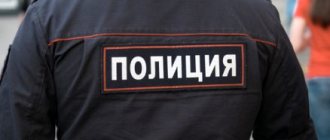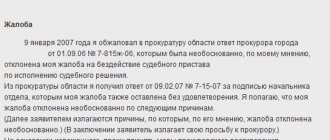New edition of Art. 124 Code of Criminal Procedure of the Russian Federation
1. The prosecutor or head of the investigative body considers the complaint within 3 days from the date of its receipt. In exceptional cases, when in order to verify a complaint it is necessary to request additional materials or take other measures, the complaint may be considered within 10 days, of which the applicant is notified.
2. Based on the results of consideration of the complaint, the prosecutor or the head of the investigative body makes a decision to fully or partially satisfy the complaint or to refuse to satisfy it.
2.1. If a complaint filed in accordance with part two of Article 123 of this Code is satisfied, the resolution must indicate the procedural actions taken to speed up the consideration of the case and the deadlines for their implementation.
3. The applicant must be immediately notified of the decision made on the complaint and the further procedure for appealing it.
4. In the cases provided for by this Code, the inquiry officer or investigator has the right to appeal the actions (inaction) and decisions of the prosecutor or the head of the investigative body, respectively, to a higher prosecutor or the head of a higher investigative body.
Commentary on Article 124 of the Code of Criminal Procedure of the Russian Federation
1. In the commented article, a prosecutor means a prosecutor who oversees the implementation of laws by the given person (body) conducting the inquiry.
2. Within three days, a decision should be made on a complaint only when the complaint itself contains sufficient data indicating the need to make a particular decision, that is, there is no need to verify it.
3. If, in order to establish the presence or absence of grounds for full or partial satisfaction of the complaint or for refusing to satisfy it, a preliminary verification of the complaint should be carried out, the period for checking the complaint can be up to ten, but not more than, days. The deadline for reviewing a complaint cannot be extended.
4. If there are no grounds for satisfying the complaint, a decision is made to refuse to satisfy it. After some time, the preliminary investigation may reveal new circumstances, in connection with which a new similar complaint received by the head of the investigative body (prosecutor) will be satisfied.
5. The decision on full or partial satisfaction of the complaint, as well as on the refusal to satisfy the complaint, must set out the reasons for the refusal, according to which the complaint was recognized as unfounded.
6. See also commentary to Art. Art. 19, 42 Code of Criminal Procedure of Russia.
Sample complaint to the prosecutor's office about the inaction of the investigation in accordance with Art. 124 Code of Criminal Procedure of the Russian Federation
Prosecutor of the Industrial District of Samara
Bobrovsky Vyacheslav Nikolaevich
Address: 443016, Samara, st. Sredne-Sadovaya, 72
From the lawyer of Antonov and Partners Law Firm, Anatoly Petrovich Antonov
,
reg. No. 63/2099 in the register of lawyers of the Samara region
Address for correspondence:
443080, Samara, Karl Marx Avenue,
192, office 619, tel. 8-917-151-82-72
In the interests
LLC “NAME1”
COMPLAINT
(in accordance with Article 124 of the Code of Criminal Procedure of the Russian Federation)
The investigative department for the investigation of crimes committed on the territory of the Industrial District of the Investigative Directorate of the Ministry of Internal Affairs of Russia for the city of Samara was in the process of criminal case No. NUMBER 1 regarding the fraudulent possession of a car brand “INFINITI Q70” no. NUMBER 2, worth 3,124,125 rubles, owned by LLC “NAME1”. The damage was caused to LLC “NAME1” represented by its legal representative FULL NAME1 in the amount of 3,124,125 rubles, which is a particularly large amount.
Based on order NUMBER 3 dated 07/03/2019, power of attorney dated 07/15/2019, I represent the interests of NAME1 LLC in this criminal case.
I am forced to draw your attention to gross violations of the requirements of criminal procedure legislation
, committed by officials of the investigative department for the investigation of crimes committed on the territory of the Industrial District of the Investigative Directorate of the Ministry of Internal Affairs of Russia for the city of Samara during the preliminary investigation in criminal case No. NUMBER 1.
The grounds for applying measures of prosecutorial response and control over the material are as follows:
1) Inaction (action) of officials of the investigative department for the investigation of crimes committed on the territory of the Industrial District of the Investigative Directorate of the Ministry of Internal Affairs of Russia for the city of Samara, expressed in failure to fulfill their procedural powers in accordance with the criminal procedure law of the Russian Federation.
— Based on the results of the investigation of the specified criminal case, officials of the preliminary investigation body repeatedly made procedural decisions to suspend the proceedings on the basis of paragraph 1 of Part 1 of Article 208 of the Code of Criminal Procedure of the Russian Federation, due to the failure to identify the person to be brought in as a suspect (accused) under business.
I do not agree with the decisions made; I consider them illegal and unfounded.
Since the basis for suspension is the failure to identify the person to be brought in as a suspect (accused) in the case, although the preliminary investigation body is reliably aware that the car was rented by Full Name 2, after which the car disappeared, as did the renter himself, which is confirmed by the testimony of the victim Full Name 1 Also to the investigation from the interrogation of the victim, Full Name 1, it is known that earlier, before Full Name 2, he tried to carry out fraudulent actions with the car, Full Name 3. All persons involved in the case have been identified.
Clause 4 art. 7 of the Code of Criminal Procedure of the Russian Federation requires that decisions be legal, justified and motivated. In its ruling dated January 25, 2005 No. 42-O, the Constitutional Court of the Russian Federation recognized that Art. 7 of the Code of Criminal Procedure of the Russian Federation in its constitutional and legal interpretation does not allow the inquirer, investigator, prosecutor, as well as the court to refuse to study and evaluate all the arguments presented in the statement, petition or complaint, as well as to motivate their decisions by indicating specific, sufficient grounds for which these arguments are rejected.
— For almost five years, sufficient and effective measures have not been taken in this criminal case aimed at intensifying the necessary investigative actions that could lead to the speedy completion of the preliminary investigation and the adoption of a legal and informed decision.
Clause 2 of Art. 21 of the Code of Criminal Procedure of the Russian Federation requires the investigator, in each case of detection of signs of a crime, to take the prescribed measures to establish the event of the crime, to expose the person or persons guilty of committing the crime.
— At present, the law office and the victim have not received notifications about the suspension or extension of criminal case No. NUMBER 1; the applicant and the applicant’s representative do not know what is happening in the criminal case.
The preliminary investigation body completely ignores the provisions of Part 8 of Article 162, Art. 209 of the Code of Criminal Procedure of the Russian Federation, according to which: 1) the investigator notifies in writing the accused and his defense attorney, as well as the victim and his representative about the extension of the preliminary investigation period; 2) having suspended the preliminary investigation, the investigator notifies the victim, his representative, civil plaintiff, civil defendant or their representatives about this and at the same time explains to them the procedure for appealing this decision.
— Also, the victim, FULL NAME1, knows that several witnesses directly point to FULL NAME3 as the person who, after the car went missing, handed it over to be driven to another city.
The persons who committed fraudulent acts with a car brand “INFINITI Q70” NUMBER 2 region, worth 3,124,125 rubles, are known to the investigation and their involvement is reflected in the interrogations of witnesses.
Based on the above, to date, persons involved in the commission of a crime, Full Name 2, Full Name 3, have not been charged (in absentia) with committing a crime under Part 4 of Article 159 of the Criminal Code of the Russian Federation, and these persons have not been put on the wanted list.
Thus, the inaction (action) of officials of the investigative department for the investigation of crimes committed on the territory of the Industrial District of the Investigative Directorate of the Ministry of Internal Affairs of Russia for the city of Samara in failure to fulfill their procedural powers in accordance with the criminal procedural law of the Russian Federation entails a violation of the legitimate rights and interests of the victim.
2) Red tape admitted in criminal case No. NUMBER 1.
The investigation into this criminal case began on August 24, 2015, almost five years ago.
For a long period of time, the preliminary investigation of the criminal case has not been completed, which indicates red tape and failure to make legal decisions, which is a gross violation of the requirements of Art. 6.1 Code of Criminal Procedure of the Russian Federation.
Failure to carry out the necessary investigative actions in a timely manner resulted in a violation of the reasonable time limits for criminal proceedings established by Art. 6.1 Code of Criminal Procedure of the Russian Federation
,
which in turn gives rise to gross red tape, which damages the constitutional rights and freedoms of the victim, impedes his access to justice, and leads to vicious practices.
Based on the above, guided by Ch. 16 Code of Criminal Procedure of the Russian Federation,
Ask:
Article 127 of the Code of Criminal Procedure of the Russian Federation. Complaint and submission against the verdict, ruling, court order
- Complaints and submissions against sentences, rulings, decisions of courts of first and appellate instances, as well as complaints and submissions against court decisions taken during pre-trial proceedings in a criminal case, are brought in the manner established by Chapters 45.1 and 47.1 of this Code.
- Complaints and submissions against court decisions that have entered into legal force are submitted in the manner established by Chapters 48.1 and 49 of this Code.
professional criminal lawyer
in Moscow
Review Process
Art. 124 of the Code of Criminal Procedure provides for a unified algorithm of actions on materials submitted for consideration, no matter who received them - a superior or a prosecutor.
You are given 3 days to make a decision. This period is counted from the day when the application was received by the relevant employee. He has the right to make a decision based on the materials provided by the applicant, as well as request additional information. These are available upon request. In this case, the transfer of documents is carried out by the assistant investigator. The complaint is also sent to the prosecutor.
The investigator or inquiry officer most often attaches an explanation of his actions to the application. This reveals the full picture of what is happening.
Some cases are simple, and what is written in the application is enough, others require detailed study. Requests and execution of orders take a lot of time, employees are overloaded and do not have time to meet the allotted time.
Because of this, the prosecutor's office uses the right to extend the deadline for prosecutorial inspections, which in this case is illegal, but is practiced, for example, when checking the legality of a refusal to initiate a case. Instead of 10 days, it lasts for months.
In general, the procedure for considering a complaint is the same; it does not matter who is obliged to make a decision on it.
Features of the prosecutor's office
The same procedure applies in the prosecutor's office. At the same time, there are boxes in which people have the right to leave their appeals. They are subsequently registered and signed for the addressees.
Often the complaint ends up in the prosecutor's office that is being complained about. This procedure is considered legal, because formally the order is given to another employee or the decision is made by the deputy prosecutor, but now the prosecutor himself will decide everything. Despite the criticism, this system continues to exist.
How do they answer?
The results of the complaint may be as follows:
- completely denied;
- partially denied;
- Full consent is given.
Art. 124 of the Code of Criminal Procedure of the Russian Federation with comments of the Constitutional Court requires officials to evaluate the arguments in their responses and motivate their agreement or disagreement with them. It is obligatory to specify the arguments; in fact, it is forbidden to give formal, template answers.
If the inspector agrees with the complaint, he indicates exactly what actions are considered illegal and what specific measures should be taken by the investigator in the future.
The person conducting the investigation may order an examination, interrogation, or confrontation.
The complaint may concern a recusal, in which case the materials are transferred to another official.
In practice, partial recognition of actions is made. For example, one or another action is declared illegal, but this does not carry any consequences for the guilty official.
The response is sent by mail in paper form.
How to submit an application
The papers are handed over to the investigator or inquiry officer, he himself is obliged to hand them over to the addressee, but it is necessary to ensure that the document is recorded in the correspondence books, otherwise it will not get anywhere further than the office. The submitter's copy is marked with an incoming number.
Art. 124 of the Code of Criminal Procedure of the Russian Federation does not regulate the registration process; it is based on regulatory documents of the Ministry of Internal Affairs, the prosecutor's office, the Investigative Committee, and the FSB.
It is best to submit the complaint directly to the prosecutor or department head in person. On the first copy, the official puts his signature and the date of acceptance. The papers are accepted at the office of the authorities, where the copy is also marked with acceptance and signed by the employee.
If you fail to achieve results
The first in the chain of officials is the head of the department, then the district prosecutor, unless the case is handled by a higher-level investigative department.
A complaint is filed against an illegal response to a higher-ranking prosecutor, then to the next one, until the papers end up in the Prosecutor General's Office. Sometimes you can achieve results there.
Complaint Art. 124 of the Code of Criminal Procedure of the Russian Federation is not limited. Trials begin with district courts, where they are given the opportunity to express all their arguments, so the material goes through a new stage from the very bottom to the Supreme Court of the Russian Federation.
Perseverance allows citizens to achieve results, not always and not immediately, but the opportunity still exists.
The problem, unfortunately, is also in the system for responding to complaints. This is the attitude of officials and the people themselves, their reluctance to seek help from specialists or to study the law themselves and the practice of its application. After all, even a seasoned expert on the law with experience never gives a complete guarantee.
Who has the right to what?
Complaints are an effective tool for asserting the rights of participants in the process and other citizens or organizations whose interests are affected by the actions of the investigator or interrogator.
Norm Art. 124 of the Code of Criminal Procedure is formulated in the broadest possible way. Anyone is allowed to complain; their status in the case does not matter. Anyone who does not have the status of a party to the case is required to justify how exactly the decision or lack of action caused them harm.
The complaint must state the facts, reference the law, and the violations must have a causal connection with the criminal case. If there is no such connection, they will make a negative decision even on a well-founded complaint. Art. 124 of the Code of Criminal Procedure operates exclusively within the framework of criminal proceedings.
In this regard, it is most convenient to complain to the prosecutor’s office; having identified violations, its employees are obliged to respond. Materials from the department in charge of supervision of the investigation and operational units are transferred to the general supervision department. Some employees prefer to immediately give a negative answer. Unlike the police and the Investigative Committee or the FSB, their competence extends beyond the scope of the criminal process.
Article 123 of the Code of Criminal Procedure of the Russian Federation. Right of appeal
- Actions (inaction) and decisions of the body of inquiry, the inquiry officer, the head of the inquiry unit, the investigator, the head of the investigative body, the prosecutor and the court may be appealed in the manner established by this Code by participants in criminal proceedings, as well as other persons to the extent that the procedural actions and procedural decisions taken affect their interests.
- If reasonable time limits for criminal proceedings are violated during pre-trial proceedings in a criminal case, participants in criminal proceedings, as well as other persons whose interests are affected, may contact the prosecutor or the head of the investigative body with a complaint, which must be considered in the manner and within the time limits established by Article 124 of this Code.






